Lebanon has approved the extradition of Egyptian activist Abdul Rahman al-Qaradawi to the UAE despite warnings from Amnesty International about potential human rights abuses. Al-Qaradawi, arrested after returning from Syria, had criticized several governments, raising concerns over the extradition requests from both Egypt and the UAE. His lawyer plans to appeal the decision amid fears for his safety.
The Lebanese government has approved the extradition of Egyptian activist Abdul Rahman al-Qaradawi to the United Arab Emirates (UAE), despite critical warnings from Amnesty International regarding potential human rights abuses he may face upon return. Al-Qaradawi, previously arrested in Lebanon, is the son of the late Muslim Brotherhood cleric Yusuf al-Qaradawi and had recently expressed his discontent towards the UAE and Egyptian authorities. The decision follows requests for extradition from both the UAE and Egypt, complicating al-Qaradawi’s legal situation further. His lawyer intends to file an urgent appeal against the extradition, underscoring the risks he faces if returned.
The extradition order comes amid a backdrop of increasing tensions between the Middle Eastern nations and those who criticize their governments. Al-Qaradawi, captured on video expressing hope for the Syrian population and condemning the UAE, Egypt, and Saudi Arabia, represents a figure of dissent against oppressive regimes. His family’s plea for his release and the growing concern over his treatment have brought international attention to this case.
Amnesty International has emphasized that his comments should be viewed as an exercise of legitimate free speech rather than a crime, cautioning that extraditing him would expose him to serious threats, including enforced disappearance and torture. Sara Hashash, the deputy director for the Middle East and North Africa at Amnesty International, has publicly denounced the move, stating it poses a test for Lebanon’s dedication to human rights. Al-Qaradawi’s case highlights the larger pattern of suppression faced by activists in the region, further exacerbated by his sister’s ongoing detention in Egypt under dubious terrorism-related charges.
The issue of political dissent and human rights violations in the Middle East is a growing concern, particularly regarding extraditions of individuals who have publicly criticized their governments. Abdul Rahman al-Qaradawi, linked to the prominent Muslim Brotherhood, presents a case that encapsulates the fears many activists face when confronted with oppressive regimes. Reports indicate that individuals returning to Egypt or the UAE often encounter severe persecution, making al-Qaradawi’s situation highly precarious. His prior criticisms of these governments demonstrate the risks involved in the exercise of free expression in such political climates.
In summary, the Lebanese government’s decision to extradite Abdul Rahman al-Qaradawi to the UAE raises serious concerns regarding potential human rights violations. The move has been criticized by various human rights organizations, including Amnesty International, which underscores the risks al-Qaradawi faces in terms of torture and enforced disappearance. His case serves not only as a personal struggle but also as a barometer for the state of freedom of expression and governmental treatment of dissenting voices in the region.
Original Source: www.aljazeera.com




